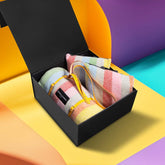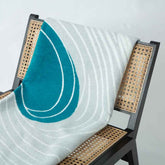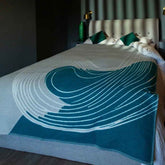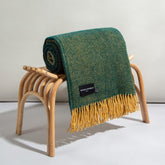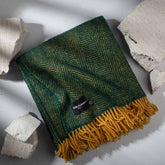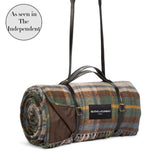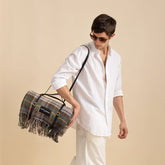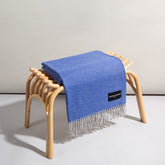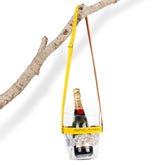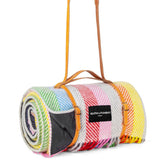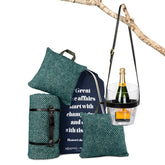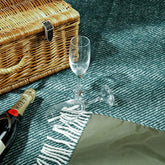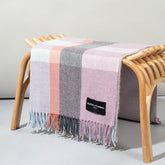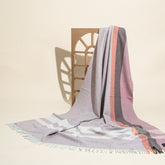Eco-Friendly Picnic Blankets: Sustainable Materials and Practices
Outdoor gatherings and picnics are excellent ways to enjoy nature, spend time with family and friends, and soak up the sun. However, as we become more environmentally conscious, it's essential to consider the impact of our choices on the planet. One of the easiest ways to make your picnic more sustainable is by choosing an eco-friendly picnic blanket.
In this blog post, we'll explore sustainable materials and practices for eco-friendly picnic blankets, so you can have a guilt-free, environmentally responsible outdoor experience.

Sustainable Materials for Eco-Friendly Picnic Blankets
Picking a picnic blanket made from sustainable materials is a smart choice for those who appreciate the natural properties and environmental benefits it provides.
- Wool: Wool is a natural, renewable, and biodegradable material that offers excellent insulation and water resistance. Sourced from sheep, alpaca, or even recycled wool garments, this sustainable material is ideal for picnic blankets. Wool is naturally breathable, moisture-wicking, and odour-resistant, making it an excellent choice for outdoor activities. Wool's natural crimp and elasticity help it resist wear and tear, ensuring a longer-lasting picnic blanket. When choosing wool, look for wool from farms that practice responsible animal husbandry and prioritize animal welfare.
- Organic Cotton: Organic cotton is grown without synthetic fertilizers, pesticides, or genetically modified organisms (GMOs). This sustainable fabric is not only gentle on the environment but also soft and comfortable for picnicking. Look for GOTS (Global Organic Textile Standard) certified organic cotton to ensure you're getting a truly eco-friendly option. Our collection with waxed organic cotton backing is a perfect example.
- Recycled Polyester: Polyester is a popular choice for outdoor blankets due to its durability and water resistance. Opt for recycled polyester, which is made from post-consumer waste like plastic bottles, to reduce your environmental footprint.
- Hemp: Hemp is an eco-friendly, fast-growing, and renewable resource that requires little water and no pesticides. Hemp fabric is known for its durability, UV resistance, and natural anti-microbial properties, making it an excellent choice for a picnic blanket.
- Bamboo: Bamboo is another sustainable and renewable resource that can be made into fabric. Bamboo fabric is soft, naturally hypoallergenic, and has moisture-wicking properties.
- Jute or Sisal: For a more natural, rustic look, consider a picnic blanket made from jute or sisal fibres. These materials are biodegradable, durable, and can be harvested with minimal impact on the environment.
Green Practices for Eco-Friendly Picnic Blankets
Making the switch to an eco-friendly picnic blanket is a small but significant way to reduce your environmental impact and promote a more sustainable lifestyle.

By choosing sustainable materials and supporting responsible practices, you can enjoy your outdoor gatherings guilt-free, knowing you're doing your part to protect the planet.
- Choose Responsibly Sourced Materials: When selecting a picnic blanket, make sure the materials are responsibly sourced. This means choosing fabrics that are grown or produced using environmentally friendly practices and ethical labour standards.
- Opt for Local Production: Purchasing a picnic blanket made locally can reduce the carbon footprint associated with transporting goods long distances. Additionally, supporting local businesses helps strengthen your community's economy.
- Buy from Environmentally Conscious Brands: Choose a picnic blanket from a brand that prioritizes sustainability and has transparent, eco-friendly policies. Look for certifications like B Corporation, Fair Trade, or GOTS to ensure the company is committed to environmental responsibility.
- Care for Your Picnic Blanket Properly: Extend the life of your picnic blanket by following the care instructions provided by the manufacturer. Washing your blanket only when necessary and air drying it can save energy and reduce its environmental impact.
- Recycle or Repurpose Your Picnic Blanket: When your picnic blanket has reached the end of its life, consider recycling it if the material is recyclable, or repurpose it into something new, like a pet bed, a cushion cover, or a reusable shopping bag.
Picking a picnic blanket made from sustainable materials is a smart choice for those who appreciate the natural properties and environmental benefits it provides. When selecting a wool picnic blanket, be sure to choose ethically sourced wool and practice proper care to ensure you are making the most environmentally responsible decision.
At Heating & Plumbing London, we are dedicated to minimizing our carbon footprint from design to manufacturing. The brand's commitment to sustainability is evident in its choice of local artisans and manufacturers, as well as its participation in Selfridges' Project Earth initiative.
- Local Manufacturing: Heating & Plumbing has made a conscious effort to work with manufacturers located close to their London studio. Their furthest manufacturer is just over 500 miles away, while their nearest artisan workshop is under 8 miles away. By partnering with three London-based workshops, Heating & Plumbing significantly reduces the carbon emissions associated with transportation.
- Sourcing Local Mills, Workshops, and Leathersmiths: Heating & Plumbing has built long-standing relationships with local mills, workshops, and leather smiths, supporting British manufacturing heritage and reducing their carbon footprint. Sourcing materials and labour locally not only benefits the environment but also contributes to the local economy.
- Selfridges' Project Earth: As a proud participant in Selfridges' Project Earth, Heating & Plumbing aligns with the initiative's goals of promoting sustainable and environmentally responsible practices. This partnership further demonstrates the brand's commitment to creating beautifully made accessories with the planet in mind.
By focusing on local production, sustainable sourcing, and collaboration with eco-conscious initiatives, Heating & Plumbing London exemplifies how a luxury brand can create high-quality wool picnic blankets while minimizing their environmental impact. Customers can feel confident in their choice of a Heating & Plumbing picnic blanket, knowing that they are supporting a company dedicated to preserving the planet for future generations.























